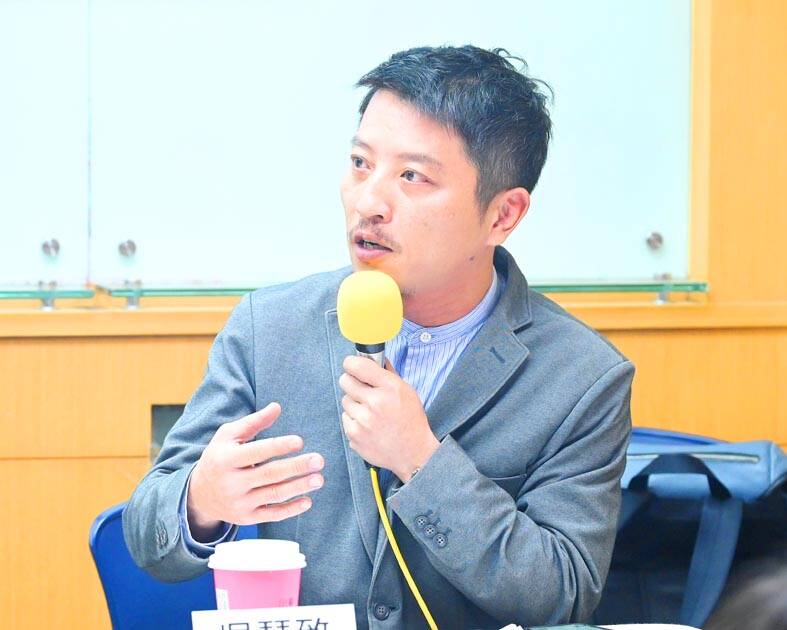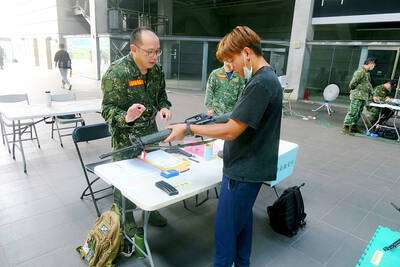A Chinese Internet influencer’s criticism of a Taiwanese hotel in Paris for its Olympics decorations was authorized by Beijing, as China restricts online speech and demands that Internet commentators and personalities follow its political script, a Taiwanese security analyst said yesterday.
Taiwan Thinktank researcher Wu Se-chih (吳瑟致) was commenting on an incident last week in which a Chinese influencer recorded a video criticizing the Paris branch of the Evergreen Laurel Hotel — a hospitality subsidiary of Taiwan’s Evergreen Group — for not including the Chinese flag in its Olympic decor.
The hotel management apologized shortly after the video went viral on Sina Weibo.

Photo: Wang Yi-sung, Taipei Times
The user later posted an image showing a document purportedly issued by the French branch of the China Council for the Promotion of Peaceful National Reunification, saying the video was “factually accurate” and followed its guidelines on “reunifying” Taiwan.
Commenting on the case, Wu said that a political motive should always be assumed with content about Taiwan’s statehood from a Chinese influencer, as the Chinese Communist Party’s aim is to undermine Taiwan’s sovereignty.
Internet celebrities are an important propaganda tool for Beijing, as evidenced by its cultivation of influencers for “united front” activities targeting Taiwan and projecting the image of revived national strength abroad, he said.
Additionally, influencers among the Chinese diaspora could act as confidential informants for Beijing’s “overseas police service stations” or agitators to rouse nationalist fervor among Chinese immigrants, he said.
The video’s publication was authorized by Beijing to supplement other operations to suppress the display of images and banners about Taiwan during the Paris Olympics, he said.
Evergreen Laurel Hotel’s apology signaled to the Chinese government that its tactics work, which would encourage more behavior of a similar nature, he said.
The incident would encourage the Chinese government to pressure Taiwanese businesses and gauge their reaction, Wu said.

A magnitude 6.4 earthquake struck off the coast of Hualien County in eastern Taiwan at 7pm yesterday, the Central Weather Administration (CWA) said. The epicenter of the temblor was at sea, about 69.9km south of Hualien County Hall, at a depth of 30.9km, it said. There were no immediate reports of damage resulting from the quake. The earthquake’s intensity, which gauges the actual effect of a temblor, was highest in Taitung County’s Changbin Township (長濱), where it measured 5 on Taiwan’s seven-tier intensity scale. The quake also measured an intensity of 4 in Hualien, Nantou, Chiayi, Yunlin, Changhua and Miaoli counties, as well as

Credit departments of farmers’ and fishers’ associations blocked a total of more than NT$180 million (US$6.01 million) from being lost to scams last year, National Police Agency (NPA) data showed. The Agricultural Finance Agency (AFA) said last week that staff of farmers’ and fishers’ associations’ credit departments are required to implement fraud prevention measures when they serve clients at the counter. They would ask clients about personal financial management activities whenever they suspect there might be a fraud situation, and would immediately report the incident to local authorities, which would send police officers to the site to help, it said. NPA data showed

ENERGY RESILIENCE: Although Alaska is open for investments, Taiwan is sourcing its gas from the Middle East, and the sea routes carry risks, Ho Cheng-hui said US government officials’ high-profile reception of a Taiwanese representative at the Alaska Sustainable Energy Conference indicated the emergence of an Indo-Pacific energy resilience alliance, an academic said. Presidential Office Secretary-General Pan Men-an (潘孟安) attended the conference in Alaska on Thursday last week at the invitation of the US government. Pan visited oil and gas facilities with senior US officials, including US Secretary of the Interior Doug Burgum, US Secretary of Energy Chris Wright, Alaska Governor Mike Dunleavy and US Senator Daniel Sullivan. Pan attending the conference on behalf of President William Lai (賴清德) shows a significant elevation in diplomatic representation,

The Taipei City Reserve Command yesterday initiated its first-ever 14-day recall of some of the city’s civilian service reservists, who are to undergo additional training on top of refresher courses. The command said that it rented sites in Neihu District (內湖), including the Taipei Tennis Center, for the duration of the camp to optimize tactical positioning and accommodate the size of the battalion of reservists. A battalion is made up of four companies of more than 200 reservists each, it said. Aside from shooting drills at a range in New Taipei City’s Linkou District (林口), the remainder of the training would be at